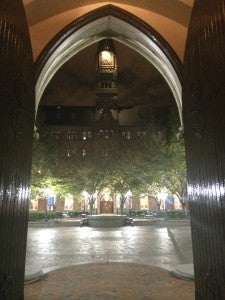In the Quietude of the Mind, in the Silence of the Heart
As a college student, my mind is never quiet, and it’s hardly ever composed. Anxious thoughts race and worries scatter, while doubts and second thoughts trail and linger. Such was also the temperament of my prayer: frenzied and mindless. It wasn’t until my immersion in the Prayer in Daily Life Retreat that I found, in my prayer at Georgetown, mindfulness.
Growing up in a Catholic household, I thought prayer to be reflexive, naturally prompted and nearly spontaneous before meals and a good night’s rest. As time went on, prayers of gratitude continued to gladly emanate from the blessings of my experiences. To me, there was no greater bliss than time spent in reflection of how lovely the people in my life were, and how graced each moment with them had been. I internalized such blessings as the presence of God in my life.
But this was not to be mistaken for the presumption that God felt present in my prayer in daily life. My spirituality was contingent upon the past. I most concretely needed former experiences that I found value in to serve as the exigence to my prayers of gratitude. I would rejoice in song in the 7:30 choir, but even so, the hymns served as a faith history of sorts for me, having grown up on them since Catholic grade school. Seeking emergence from the stasis of my faith and the spiritual despondency I was feeling, I signed up for the Prayer in Daily Life Retreat.
The Prayer in Daily Life Retreat is a gem amongst Campus Ministry retreats, because it does not take you outside of the front gates of Georgetown. Thus, I was met with the challenge to dissolve the boundary separating my academic and spiritual lives on campus. Dedicating the time to reflect with Scripture initially felt quite odd and unnatural indeed, as it went against my very instincts as a busy college student. Of course, the nature of my first Scripture reading took to that of sifting through a textbook, which I had done in the hour before, with notes quickly jotted in a journal referencing and highlighting pertinent lines of the passage. Perhaps I was anxiously preparing to present my findings to my spiritual director the following afternoon. Mindless it was, to again fret about the inadequacy of my prayer, my own unworthiness in invoking God’s name, and the naiveté of requesting help from God for that which might not be best for my personal growth.
Mindfulness. My spiritual director helped me achieve mindfulness by urging me to discern that which is preventing me from growing in my faith, hindering me from feeling the presence of God. To my first Scripture reading of Psalm 139, my mind immediately flew and found solace. The psalm states, “O LORD, you have probed me, you know me…” and all of my thoughts: my fears and my sorrows, my passions and joys, the depth of the mindless pit that is my faith life and my very desire to find you and spiritual fulfillment. Through Scripture, I became aware of my intrinsic transparency in the eyes of the Lord and recognized my chaotic mind as the erected barrier between my heart and God. Spirituality is seeking spirit and life beyond oneself, and my mind, so engrossed in self-reflection, needed to transcend its confines to my own past personal experiences. Scripture helped me reconcile the perpetual struggle between the head and the heart by composing the mind, filling it with the sacred Word of God, and setting it free to another context with open air for spiritual imagination. In the quietude of the mind and in all its fullness of life and love, I was finally able to read the intentions silently written on my heart, the intentions of finding hope in a present and future of uncertainty and bewilderment. Not only will I always feel gratitude for the guidance from my spiritual directors in the Prayer in Daily Life Retreat, but I will also remain awakened to a grounding gravitational pull to the sacred and attuned to God’s entrusting call to me in the midst of the liminalities of my lifetime.
Jasmine Leewong, COL ’17
- Tagged
- Retreats
